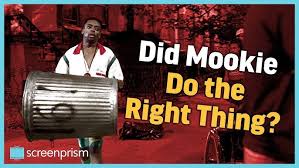Mookie the Lil' Teapot
- Marc A. Tager
- Sep 10, 2024
- 3 min read

I was not a fan of Spike Lee’s movies, including Do the Right Thing, which had its debut in 1989 when I was 23. I must attribute it to ignorance, having been conditioned to have a particular view of the world which I am not proud of. I was living in Dallas, Texas working in my parents’ retail business and just partying through my youth. I believed the country to be a fair place with equal chances for everyone and where you could change your lot in life if you just worked harder. Looking back after I watched it again, I can honestly say the best part of my thinking then was synonymous with the statement “Ignorance is Bliss”, which helps me not be so ashamed.
Our world is rife with social conflict, racial tension, and ethical ambiguity along with many other issues, so what does it mean to act virtuously? Do the Right Thing drives viewers to confront a reality that is difficult to fathom, where doing "the right thing" becomes an almost impossible task. Aristotle’s Virtue Theory preaches cultivating good character and moral habits, in the zone where virtuous actions are found between extremes. Blending Dussel’s Liberation Ethics, helps us tie together the ideas of Virtue Theory to Spike Lee’s Do the Right Thing by telling us to provide a voice to the disenfranchised.
At 00:47 in the video Aristotle & Virtue the Crash Course Philosophy #38 “Aristotle and other virtue theorists reasoned that, if we can just focus on being good people, the right actions will follow, effortlessly.” He further states that we should hit the mean between two extremes like with courage which could be defined as the mean between cowardice and recklessness (4:02). This framework works well in a vacuum, but in Do the Right Thing, it is an impossible path to walk in the face of systemic racism, injustice and senseless violence. How do we find the virtuous medium and speak for the marginalized majority in this world where societal structures are deeply unjust?
Spike Lee plays Mookie who tries to navigate his life virtuously in an unforgiving environment constantly brewing with this tension. Throughout the film he tries to do the right thing keeping his cool a prime example of this is his dealings with Pino, who might be called MAGA today. Pino goads him throughout the film and Lee’s character with racial epitaphs which builds the pressure in the little teapot that is Mookie. The teapot finally bursts at the film’s climax, when Mookie launches a trash can through the pizza shop’s window after the police murder Radio Raheem. This brings to a head the conflux of institutional racism, social injustice and violence spurring a riot and the destruction of Sal’s livelihood. Is this the "right thing"? Registering my thoughts on what I believe Dussel would say about Do the Right Thing, leads me to say Mookie’s action begin to looks more like a response to a justice call from the disenfranchised.
Do the Right Thing emboldens us to look at a world of systemic injustice through a lens of Virtue Theory. Aristotle’s writing offers valuable insights into moral development on an individual basis. Dussel’s emphasis on the marginalized reframes the "right thing" as an act of resistance within the context of the many. Mookie’s actions, represent the moral complexities of acting virtuously in a world where oppression is the norm.




Comments